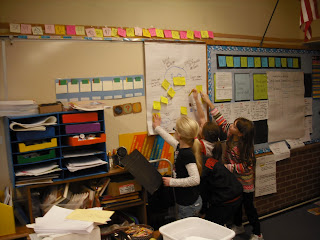This link will take you to series of 30 minutes videos detailing some of the most important big ideas in effective reading and writing teaching.
I especially recommend video 4. It explains and shows what we are all trying to implement in our writer's workshops.
Watch all of video 4 or watch just one of the nine segments and discuss it with your team or staff.
http://www.learner.org/resources/series204.html
Saturday, October 30, 2010
Wednesday, May 12, 2010
Tuesday, May 11, 2010
Monday, May 3, 2010
Tuesday, February 16, 2010
You Can't Have Too Many Editing Reminders

Faubion 4th grade teacher, Mark Hansen, expects his students to practice editing their own work. He has invested the time in teaching them how to edit. He knows it is better for writers to know how to edit their own work than to have the teacher correct all their errors for them. Once they know how to edit, he wants them to continue to do so. This chart, posted in a visible classroom spot, helps them remember and guides their work.
Sentence Openers
Anchor charts are a great way to keep track of the various ways writers open and vary sentences. Kylene Parks used this chart to work on interesting sentences with her 4th graders at Boise-Eliot.
Friday, January 8, 2010
Family Write Night
Teachers at Clarendon at Portsmouth organized a family write night in December. They invited familes to come to school and write together. This was a wonderful celebration of writing and families.
The teachers organized the event to follow the same routines they use in their writing classrooms. First, they relied on a strong model poem to guide the work. They supported the writing with specific prewriting activities, had opportunities for sharing and left plenty of time to write.
Clarendon at Portsmouth is a dual-immersion school, so the family write night they planned also included writing in both languages.
A wonderful community event!
Wednesday, January 6, 2010
Strong Word Choice Grows from Paying Attention to Words
 Mark Hansen, a 4th grade teacher at Faubion, surrounds his students with anchor charts and environmental print to support them as writers. These students are adding to charts about interesting words. Other students' words are already listed and more will continue to add words they read, hear in conversation or catch in songs.
Mark Hansen, a 4th grade teacher at Faubion, surrounds his students with anchor charts and environmental print to support them as writers. These students are adding to charts about interesting words. Other students' words are already listed and more will continue to add words they read, hear in conversation or catch in songs.Remember Why We Write
Recently I was trying to put together a workshop proposal for a conference about writing. I knew that I wanted to share an example of a lesson that tied my classroom together as a community around something that matters. I wanted to share one of my lessons about honoring all the different kinds of families my students are part of or one about making a difference in the world or just one about the simple everyday moments in life that we all need to remember to cherish.
I looked back through my notes from what I had been working on for the last month and found none of that. Sure, I found some good lessons on paragraphing or leads, and those are extremely important lessons. I just didn't find anything with heart in it.
I realized that I have been paying way too much attention to all the little craft elements of writing and not enough attention to the real reasons to write at all.
We write to share our vision of the world or to celebrate who we are and where we come from. We write to rage against injustice or to praise grandmas' cooking. We write to illuminate our unique way of understanding the world and our place in it.
As we all work harder to make sure students have the vital skills they need to succeed as writers and thinkers, let's also remember to pay attention to why people write at all.
In the words of Katie Wood Ray, "Before you can do a revision, you have to have a vision."
Remember the vision.
-Katharine
I looked back through my notes from what I had been working on for the last month and found none of that. Sure, I found some good lessons on paragraphing or leads, and those are extremely important lessons. I just didn't find anything with heart in it.
I realized that I have been paying way too much attention to all the little craft elements of writing and not enough attention to the real reasons to write at all.
We write to share our vision of the world or to celebrate who we are and where we come from. We write to rage against injustice or to praise grandmas' cooking. We write to illuminate our unique way of understanding the world and our place in it.
As we all work harder to make sure students have the vital skills they need to succeed as writers and thinkers, let's also remember to pay attention to why people write at all.
In the words of Katie Wood Ray, "Before you can do a revision, you have to have a vision."
Remember the vision.
-Katharine
Subscribe to:
Comments (Atom)


